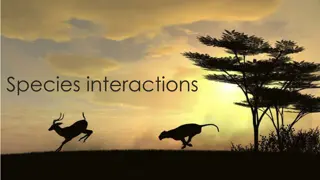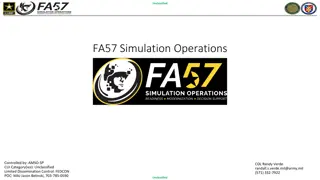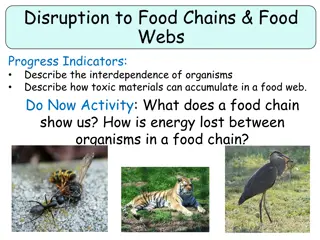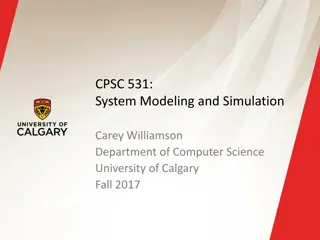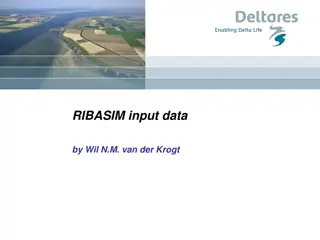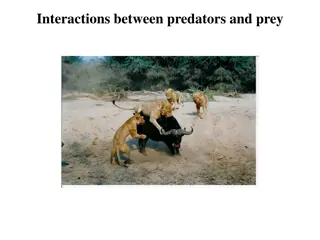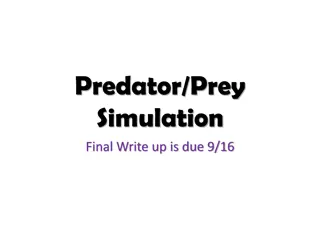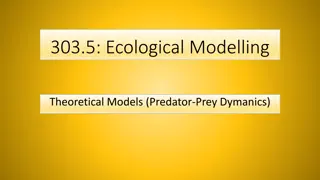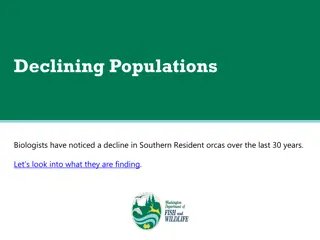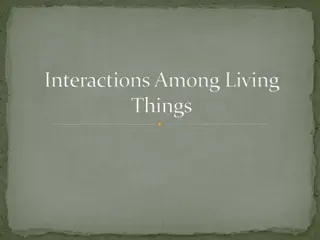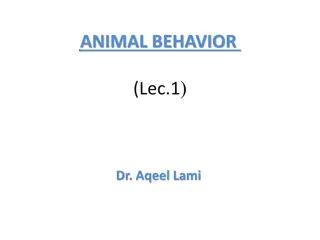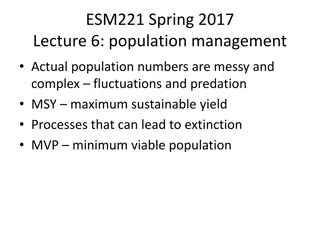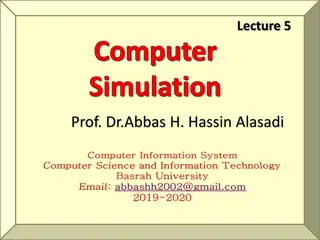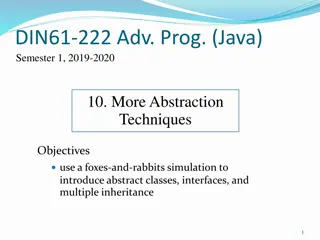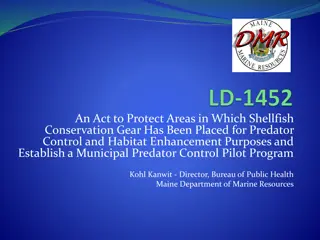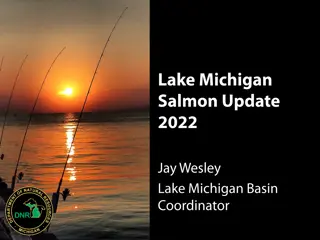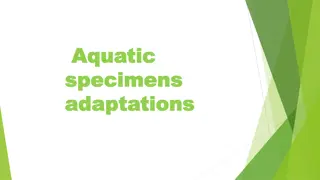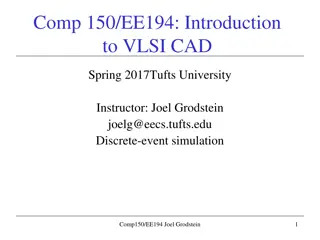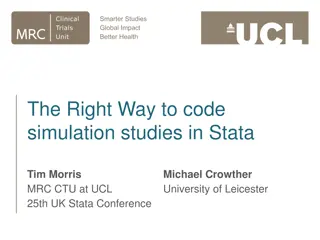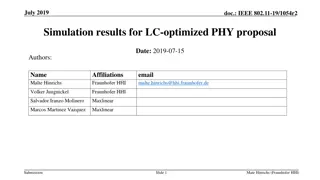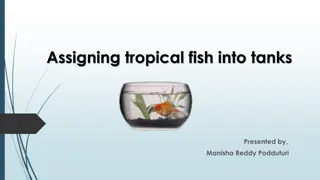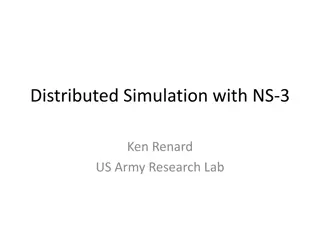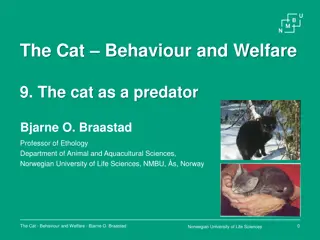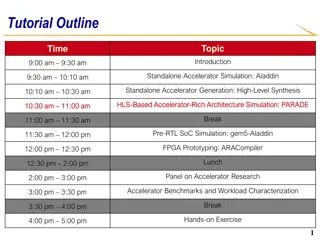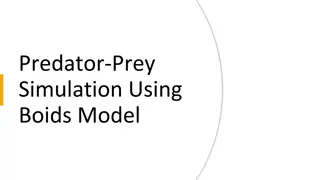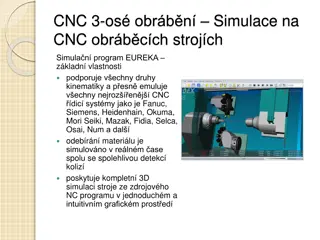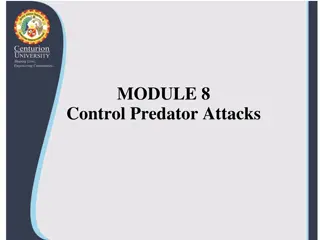Species Interactions and Predator-Prey Dynamics
Species interactions refer to the associations between different organisms that can be positive or negative, influencing the growth and evolution of populations. Predation is a key interaction where one organism hunts and feeds on another. In predator-prey dynamics, populations fluctuate in a cyclic
8 views • 36 slides
Overview of Army Modeling and Simulation Office
The U.S. Army Modeling and Simulation Office (AMSO) serves as the lead activity in developing strategy and policy for the Army Modeling and Simulation Enterprise. It focuses on effective governance, resource management, coordination across various community areas, and training the Army Analysis, Mod
3 views • 8 slides
Interdependence in Food Chains and Webs
Interdependence plays a crucial role in ecosystems where organisms rely on each other for survival. This interconnection is demonstrated through food chains and webs, highlighting the flow of energy and nutrients. Toxic materials can accumulate in food webs, disrupting the delicate balance. Changes
1 views • 13 slides
System Modeling and Simulation Overview
This content provides insights into CPSC 531: System Modeling and Simulation course, covering topics such as performance evaluation, simulation modeling, and terminology in system modeling. It emphasizes the importance of developing simulation programs, advantages of simulation, and key concepts lik
4 views • 28 slides
Unleash Your Fundraising Potential: Discover Your Predator Persona
Uncover the secrets of successful fundraising by identifying your predator persona in the fundraising jungle. Learn to strategize like a wolf, hunt like a lion, or navigate like a wild dog to increase your donor catch rate. This insightful workshop will enhance your effectiveness as a fundraiser, he
3 views • 42 slides
Basin Manipulation Simulation Analysis Tool Overview
Basin Manipulation Simulation Analysis Tool provides a comprehensive solution for managing and analyzing basin data, including tasks like basin manipulation, simulation analysis, case management, and defining simulation time steps. The tool allows for easy data entry, visualization of simulation res
11 views • 17 slides
Predator-Prey Interactions: Impacts and Equilibria
Explore the dynamics of predator-prey interactions, including what defines a predator, the impacts predators have on prey populations, and the equilibrium points in the Lotka-Volterra Predator-Prey model. Discover how predation plays a crucial role in regulating population densities and observe the
3 views • 36 slides
Predator-Prey Relationship Analysis in Natural Environments
Explore the interconnected dynamics of predator and prey populations in a natural environment through a simulation study. Investigate the impact of this relationship on the negative feedback process over time. Plan variables, predict ratios, provide examples, list materials, and outline the procedur
0 views • 11 slides
Lotka-Volterra Model for Predator-Prey Dynamics
The Lotka-Volterra model explores the intricate interactions between predator and prey populations, depicting oscillations in their sizes where the predator's peak lags behind the prey's. This model makes assumptions about exponential prey growth, predator starvation in prey absence, and unlimited p
2 views • 9 slides
Conservation Challenges Facing Southern Resident Orcas
Biologists have observed a decline in Southern Resident orcas over the past three decades, attributing it to a lack of prey, toxic contaminants, and disturbance from noise and vessel traffic. Being listed as endangered signifies a species is at severe risk of extinction. Understanding the impact of
8 views • 8 slides
Interactions Among Living Things and Adaptations in Nature
Understanding the interactions among living things, such as competition, predation, and symbiosis, sheds light on how organisms adapt to their environments through natural selection. Each organism occupies a unique niche, defining its role in the ecosystem. Predation plays a crucial role in populati
3 views • 14 slides
Animal Behavior and Ecology
Animal behavior encompasses a range of activities such as feeding, breeding, and social interactions. Ethology focuses on studying behavior in natural environments, while behavioral ecology examines ecological aspects like predator-prey interactions. Sociobiology delves into the evolution of social
3 views • 5 slides
Predator-Prey Population Cycles: Analysis and Insights
Explore the dynamics of predator-prey population cycles through mathematical models, linearization techniques, sensitivity testing, and conclusions on the role of maturation delay in shaping cycle periods and relationships between species.
18 views • 11 slides
Population Management and Sustainable Harvesting Strategies
Actual population numbers exhibit complex fluctuations influenced by predation and other factors. Understanding concepts like Maximum Sustainable Yield (MSY) and Minimum Viable Population (MVP) can help in managing populations effectively. The concept of MSY ensures the maximum harvest of a renewabl
3 views • 32 slides
Computer Simulation and Modeling Tools
Computer simulation and modeling is essential for conducting studies in various fields. Selecting the right simulation language or package is crucial for accurate results. This involves considering the characteristics of the language, such as random number generation, process transformers, list proc
5 views • 7 slides
Introduction to Abstraction Techniques using Foxes and Rabbits Simulation
Explore the benefits of simulation in predicting wildlife impact and balance in predator-prey relationships through a Java program simulating foxes and rabbits. Learn about important classes, behaviors of rabbits, and the overall simulation setup.
2 views • 53 slides
An Act to Protect Areas for Predator Control and Habitat Enhancement Purposes
LD1452 is a legislative act aimed at protecting areas where shellfish conservation gear is placed for predator control and habitat enhancement. The act establishes a municipal predator control pilot program to address the impact of green crabs on soft clam populations. It prohibits the molestation o
3 views • 25 slides
Lake Michigan Ecosystem Trends and Harvest Data
Explore the ecological trends and harvest data in Lake Michigan through images depicting mussel populations, water clarity, fish abundance, historic prey biomass, sport harvest numbers, predator-prey ratios, and salmon stocking figures. Gain insights into the dynamics of the lake's ecosystem and fis
4 views • 20 slides
Insight Into the Adaptations and Habits of Aquatic Freshwater Eels
The Anguillidae family includes freshwater eels with snake-like bodies, dwelling in diverse habitats. Their catadromous nature involves migrating to the ocean to breed. Freshwater eels serve dual roles as predator and prey, displaying unique feeding behaviors. Their body structures feature elongated
0 views • 15 slides
Introduction to VLSI CAD and Discrete-Event Simulation at Tufts University
This course introduces students to event-oriented simulation, building virtual models, and validating designs through simulation. It covers the importance of simulation in testing and refining designs before implementation. Examples include simulating VLSI networks and exploring the use of discrete-
5 views • 32 slides
The Right Way to Code Simulation Studies in Stata
Simulation studies in Stata involve using (pseudo) random numbers to generate data from a distribution for studying statistical methods. This process helps to evaluate different scenarios and understand the properties of statistical techniques. Key components like ADEMP (Aims, Data-generating mechan
12 views • 18 slides
Simulation Results for LC-Optimized PHY Proposal in July 2019
The document presents simulation results for an LC-optimized PHY proposal for TGbb based on G.9991 PHY. It includes details on the simulation setup, frame detection results, header modulation, coding simulation results, payload modulation, and coding simulation results. The setup involved various re
3 views • 18 slides
Solving the Tropical Fish Tank Assignment Puzzle
Dive into the challenge of assigning tropical fish into tanks efficiently based on predator-prey relationships, water conditions, and compatibility. Explore the graph theory approach to determine the minimum number of tanks needed, construct a graph representing fish compatibility, identify the prob
3 views • 13 slides
Distributed Simulation with NS-3
Explore the world of distributed simulation with NS-3 as presented in "Distributed Simulation with NS-3" by Ken Renard from the US Army Research Lab. Get insights into the application of NS-3 in creating advanced simulations for military research and beyond. Dive into the details of distributed simu
1 views • 38 slides
Logistic Regression with “Grouped” Data
Logistic regression analysis was performed to investigate how predator identity influences lobster survival by size in a tethering experiment. The study by Wilkinson et al. (2015) delved into the dynamics of predator avoidance responses in lobsters. Results shed light on the complex interactions bet
4 views • 17 slides
OR Teamwork Faculty Development Program
Center for Medical Simulation's program focuses on improving teamwork in operating rooms to enhance patient safety. The initiative aims to train interprofessional teams using simulation as a medium, positively influencing the OR's working culture. Supported by an insurance incentive from Harvard CRI
2 views • 12 slides
Managing Predator Impacts for Resilient Landscapes
This article discusses strategies for managing predator impacts in landscapes to promote resilience. The authors, affiliated with leading Australian institutions, address the importance of addressing predator-prey dynamics for ecosystem health and conservation efforts.
3 views • 20 slides
Data Modeling and Simulation by Dr. Fadi M. S. Alsuhimat
This presentation covers topics such as performance evaluation, simulation modeling, system taxonomy, terminology, simulation modeling development, advantages of simulation, and more. It delves into the concepts, processes, and benefits of data modeling and simulation in various systems and environm
1 views • 11 slides
Real-Time Simulation Executive for DARTS Lab Course
The Dynamics and Real-Time Simulation (DARTS) Laboratory is developing an exemplar simulation executive for their 2023 course. The simulation aims to create a dynamic vehicle assembly, set up data logging, run simulations in real-time, and render related models. The project outlines requirements, go
5 views • 42 slides
Cat Predatory Behavior and Hunting Efficiency Insights
Explore the intriguing world of the cat as a predator, delving into its hunting behavior, prey species, and hunting efficiency. Learn about the sequence of hunting behavior, the role of play in predatory activities, and the common prey species targeted by cats. Understand the factors influencing a c
0 views • 10 slides
Accelerator-Rich Architecture: Research Tools and Simulation Techniques
Explore a comprehensive agenda covering various aspects of accelerator-rich architecture, from standalone simulation to FPGA prototyping. Key topics include Aladdin simulation, High-Level Synthesis (HLS) generation, PARADE architecture simulation, gem5-Aladdin SoC simulation, and more. Join the disc
1 views • 29 slides
Functional Responses in Ecology for Pest Management
Explore the concept of functional response in ecology, which determines a predator's intake rate based on food density. This plays a crucial role in assessing biological control agents for pest management and understanding predator-prey dynamics. Different types of functional responses and their imp
1 views • 7 slides
Simulation Modeling for Decision Support
This module focuses on developing skills in modeling and simulation of business dynamics to aid decision-making, utilizing simulation software for discrete-event simulation and System Dynamics. The course includes lectures, practical exercises, group coursework, and essays to enhance students' under
0 views • 37 slides
Simulation for Decision Support: Business Dynamics & Decision-Making
Dive into the impact of organizational environment on decisions, develop simulation models, and enhance decision-making skills using DES and SD methods. Engage in practical exercises, group coursework, and essays to apply simulation approaches to real business scenarios. Gain knowledge and skills in
0 views • 10 slides
IEEE 802.19-24 Simulation Update for Coexistence of IEEE 802.15.4g and IEEE 802.11ah
Explore the simulation update for the coexistence of IEEE 802.15.4g and IEEE 802.11ah in the September 2024 document. The study focuses on smart utility use cases, presenting simulation parameters, performance metrics, and the background of the study. Dive into the details of simulation models, depl
2 views • 14 slides
DARTS Lab: Simulation Objects, Data Access, and DVar Layer
Explore the Dynamics and Real-Time Simulation (DARTS) Laboratory's run-time data access, simulation objects, DVar documentation, and the importance of the DVar layer in providing standardized access to rich data for simulation objects. Discover the significance of this layer in decoupling services f
3 views • 21 slides
Predator-Prey Simulation Using Boids Model: Realistic Evolution and Survival Patterns
Explore a predator-prey simulation using a Boids model inspired by nature's design. Witness the interplay of predator tactics and prey escape maneuvers in a realistic large-scale simulation. Dive into the challenges of scalable code and predation strategies.
4 views • 15 slides
Cutting-Edge CNC Simulation Software for Machining Excellence
Discover EUREKA simulation software, a versatile tool for CNC machining simulation with advanced features supporting various kinematics and precise emulation of top CNC control systems. Experience real-time material simulation, collision detection, and complete 3D machine simulation in an intuitive
2 views • 12 slides
Protecting Earthworms in Vermiculture: Predator Control Tips
Learn effective predator control measures for vermiculture to safeguard earthworms from birds, ants, termites, and other harmful pests. Discover preventive strategies and environmental conditions to ensure successful vermicomposting.
4 views • 5 slides
Predator-Prey Dynamics and Population Models Explained
Dive into the fascinating world of predator-prey dynamics and population models through a series of equations and graphical representations. Explore how species interactions and growth rates can be analyzed mathematically to understand ecological systems.
1 views • 26 slides
